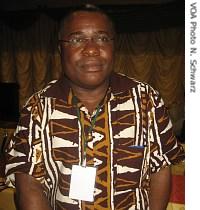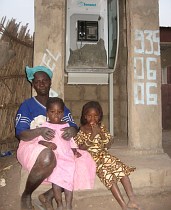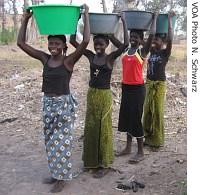2007年VOA标准英语-Nigerian High Tech Entrepreneur Seeks Profit, P
时间:2019-02-07 作者:英语课 分类:2007年VOA标准英语(六月)
Ouagadougou
12 June 2007
In Africa, the number of private technology companies is increasing as entrepreneurs and technology workers cash in on this growing sector 1. For VOA Naomi Schwarz tells the story of one such entrepreneur from Nigeria, Chijioke Eke 2, who attended a technology conference in Burkina Faso.

Chijioke Eke
When Chijioke Eke majored in computer science and economics at one of Nigeria's top universities, it was a risky 3 move.
"I had some running arguments with my father," he recalled. "He was like, gee 4, where are you going to get employment if you do not get employed by Shell, Mobil, Chevron 5. Where else?"
It was the early 1980s, and personal computers were just becoming available. Even in the United States and Europe, some people doubted that such technology had a future. In Africa, where many children were not able even to attend elementary school, and where electricity and telephone service was rare, such technology seemed like an even more distant dream.
But Eke says he knew things would not always stay this way.

In many African villages a single pay phone serves an entire community
"I am so excited that these days now people are beginning to see what we saw then," he added. "To say, hey, we cannot continue to be at the backwaters of information dissemination 6 and processing. We just have to find a way, no matter how belated, to join."
For Eke, the gamble on technology paid off quickly. Soon after he graduated, he got a job with an international consulting firm. He later held posts at the oil exploration and production arm of Shell in Nigeria and, in the early nineties, at one of Nigeria's top
information technology companies.
By the mid-1990s, Eke and a few of his colleagues decided 7 the time was right to take another gamble. They teamed up, Eke says, to found their own information and communication company, called Sidmach Technologies. The company works with the government and private companies to help them develop computer and Internet strategies.
"It was not easy. I remember those days we had just the five of us, used to sit around one table, and think of, 'now what,'" he said.
Eke says one of the projects he is proudest of at his company was the complete digital overhaul 8 of the high-school examination system. The exam, standard across many Anglophone countries in West Africa, is required for entrance into colleges and universities.
In Nigeria, more than 1 million students take the exam every year, and registration 9 paperwork for all these students used to take more than six months. Now the entire process is done with computers, in a project designed and partly financed by Eke's company, and the processing time is less than six weeks.
This makes the exam less expensive for the government and the student. It also is a safeguard against fraud, as every student is required to submit a photograph, and examiners can compare the photograph to the student who takes the exam.
Eke says he and his colleagues had a vision of a company that would not only make a profit, but have a social mission as well. He says this kind of community-oriented thinking is crucial if Africa is going to catch up to the West in the technology sector.
"I call it the crab 10 syndrome," he explained. "When you have a basket of crabs 11, each one tries to climb out at the expense of the other. And anyone that manages to tumble out, go look closely, has lost a limb or two. So why do not I be patient, you climb on me, get out, and then you give me a helping 12 hand."
But Eke says it is equally importantly that more advanced countries realize that their fate is also tied to progress in Africa.
"There is no way you are going to have very advanced society in terms of information gathering 13, dissemination, and processing and you have another continent sitting there with nothing," he added. "Somehow the developed areas are going to suffer disruptions. Because they also need information in and out of Africa."

Many Africans still have no running water
Eke says he has great hopes for progress in Africa, but he also realizes much needs to be done.
Millions of Africans live on less than $1 a day. They cannot afford computers, even at low-cost Internet cafes. Low literacy rates, lack of electricity and phone lines are also factors that limit access to technology for many Africans.
The vision Eke had in the early 1980s of an Africa driven by computer technology is still far from being realized, but the advances he has seen make him confident in the future.
- The export sector will aid the economic recovery. 出口产业将促进经济复苏。
- The enemy have attacked the British sector.敌人已进攻英国防区。
- They had to eke out a livinga tiny income.他们不得不靠微薄收入勉强度日。
- We must try to eke out our water supply.我们必须尽量节约用水。
- It may be risky but we will chance it anyhow.这可能有危险,但我们无论如何要冒一冒险。
- He is well aware how risky this investment is.他心里对这项投资的风险十分清楚。
- Their success last week will gee the team up.上星期的胜利将激励这支队伍继续前进。
- Gee,We're going to make a lot of money.哇!我们会赚好多钱啦!
- He wore shoulderstrap rank slides with sergeant's chevrons.他佩戴标示级别的肩章,上面有中士的V形标志。
- The chevron or arrow road sign indicates a sharp bend to the left or right.V形或箭头路标表示有向左或向右的急转弯。
- The dissemination of error does people great harm. 谬种流传,误人不浅。
- He was fully bent upon the dissemination of Chinese culture all over the world. 他一心致力于向全世界传播中国文化。
- This gave them a decided advantage over their opponents.这使他们比对手具有明显的优势。
- There is a decided difference between British and Chinese way of greeting.英国人和中国人打招呼的方式有很明显的区别。
- Master Worker Wang is responsible for the overhaul of this grinder.王师傅主修这台磨床。
- It is generally appreciated that the rail network needs a complete overhaul.众所周知,铁路系统需要大检修。
- Marriage without registration is not recognized by law.法律不承认未登记的婚姻。
- What's your registration number?你挂的是几号?
- I can't remember when I last had crab.我不记得上次吃蟹是什么时候了。
- The skin on my face felt as hard as a crab's back.我脸上的皮仿佛僵硬了,就象螃蟹的壳似的。
- As we walked along the seashore we saw lots of tiny crabs. 我们在海岸上散步时看到很多小蟹。 来自《简明英汉词典》
- The fish and crabs scavenge for decaying tissue. 鱼和蟹搜寻腐烂的组织为食。 来自《简明英汉词典》
- The poor children regularly pony up for a second helping of my hamburger. 那些可怜的孩子们总是要求我把我的汉堡包再给他们一份。
- By doing this, they may at times be helping to restore competition. 这样一来, 他在某些时候,有助于竞争的加强。